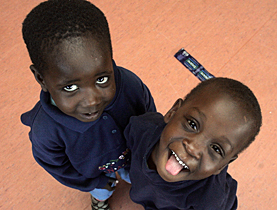Population control on the Swiss agenda

Development aid experts have attacked an initiative to slow down population growth through immigration limits and more funding for birth control in developing countries. They say it is too simplistic.
The continued growth of the world population, climate change and the strain on natural resources has revived the debate on the overpopulation of the planet, home to seven billion people.
According to the latest demographic projections the world population will reach nine billion by 2050, although some predict a decline in the world population from then on.
But the issue remains a top concern to some environmental organisations in Europe and the United States who see population and fertility control as necessary to defuse a demographic time bomb threatening all life on earth.
In Switzerland the population control initiative launched by the Ecology and Population Committee (Ecopop) is the manifestation of those fears.
A longtime campaigner on population issues, Ecopop collected more than 120,000 signatures which it handed in to the federal authorities in November to force a nationwide ballot on the subject. No date for the vote has been set yet.
The initiative puts a limit on annual immigration to Switzerland of 0.2 per cent of the resident population. It also seeks to set aside ten per cent of the country’s annual aid funds to promote voluntary measures to encourage birth control in developing countries.
In 1994, the international conference on population and development saw 179 countries affirming the right of individuals to family planning.
According to the signatories of the conference plan of action, family planning programmes are aimed at allowing couples and individuals to freely decide the number and spacing of their children using the information and means necessary.
On a global level, the birth rate continues to fall slowly, but significant disparities exist between rich and poor regions.
Poverty, inequality between the sexes and social pressure are the factors which contribute to high fertility rates.
These disparities are particularly strong in sub-Saharan Africa, where women have on average three times more children than in developed regions (5.1 per woman versus 1.7)
Today, most sub-Saharan African women want to have fewer children. The high fertility rate is increasingly a result of limited and unequal access to means to prevent unwanted pregnancies.
Source: UNFPA
Unmet need
Ecopop’s support for family planning programmes is not being heavily criticised, although some religious and political groups have long opposed this kind of work whether at home or in developing countries.
In its 2012 report, the United Nations Population Fund (UNFPA) underlines the importance of such programmes.
“Recent statistics indicate that in developing countries, of the 867 million women of reproductive age in need of modern contraceptive methods, only 645 million have access to them,” UNFPA executive director Babatunde Osotimehin writes.
“Family planning occupies a central place in the efforts aimed at improving mother and child health, promoting gender equality, improving access to quality education, allowing young people to participate fully and actively in economic activity and the life of their community and reducing poverty.
“It should therefore be totally integrated in all present and future development initiatives.”
Consumption problem
The initiative makes the link between alleged overpopulation in Switzerland and global overpopulation. “Voluntary family planning in developing countries facilitates their social, economic and sanitary evolution and cares for nature. Limiting immigration to Switzerland allows agricultural land to be preserved and leaves more room for man and nature,” its proponents argue.
The main Swiss non-governmental organisations active in development work (represented by umbrella group Alliance Sud) criticise a lack of coherence in the initiative text.
“The Ecopop initiative reduces global ecological problems to demographic growth with the notion that the more human beings there are the stronger the pressure on non-renewable resources. But it forgets the enormous differences in terms of consumption of resources,” Peter Niggli, director of Alliance Sud, said in a statement.
“If we pushed the claims of the Ecopop inititative to the extreme, we should radically limit the population in rich countries and the elites of poor countries. Because it is not the number of people which determine pressure on the environment but their use of natural resources.”
Jean-Louis Arcand, economist at Geneva’s Graduate Institute of International and Development Studies, claims the initiative mixes apples and oranges. “It lumps the issues that affect rich countries together with the issues which affect poor countries.”
“In Switzerland in particular, the ageing of the population raises the question of pensions. Who is going to fund these if not immigrants?” Arcand added.
The inverse population pyramid does not alarm Alec Gagneux of the initiative committee. “It comes down to wealth. I’m not afraid of the ageing of the Swiss population. Switzerland has enough wealth to solve the problem.”
Girl power
However Green party parliamentarian Yvonne Gilli argues that although it is necessary to support family planning with the aid budget, the ten per cent quota put forward by the initiative is too blunt an instrument.
“It has to be evaluated taking account of the whole range of development and cooperation programmes.
“For example in a particular country Switzerland’s expertise will be used to ensure the supply of safe drinking water or to support access to secondary education for girls. Such measures can also be very effective but they don’t fit in with the initiative proposals,” Gilli said.
Arcand backs up this assertion. “The most efficient way to reduce fertility rates in poor countries is to educate girls, so-called female empowerment. Providing contraception methods to an illiterate girl does not achieve much.”
The economist illustrates the terrible consequences that sometimes come from an approach centred only on birth rate.
“There are 100 million too few women in the world based on the natural proportion of males to females. That is a dangerous deficit which is the price of authoritarian programmes limiting births in India and China.”
(Translated from French by Clare O’Dea)

In compliance with the JTI standards
More: SWI swissinfo.ch certified by the Journalism Trust Initiative











You can find an overview of ongoing debates with our journalists here . Please join us!
If you want to start a conversation about a topic raised in this article or want to report factual errors, email us at english@swissinfo.ch.